Massage can be used to manage a number of issued experienced during pregnancy such as swollen feet, back pain and stress. Massages can use a range of techniques to achieve both physiological and psychological benefits. The physiological benefits of massage include a reduction in pain and swelling. The psychological benefits of massage include a reduction in stress levels and increased relaxation and mood. The therapists at Physio.co.uk can adapt their positioning during the application of massage techniques to allow the pregnant individual to feel comfortable and relaxed during the massage treatment.
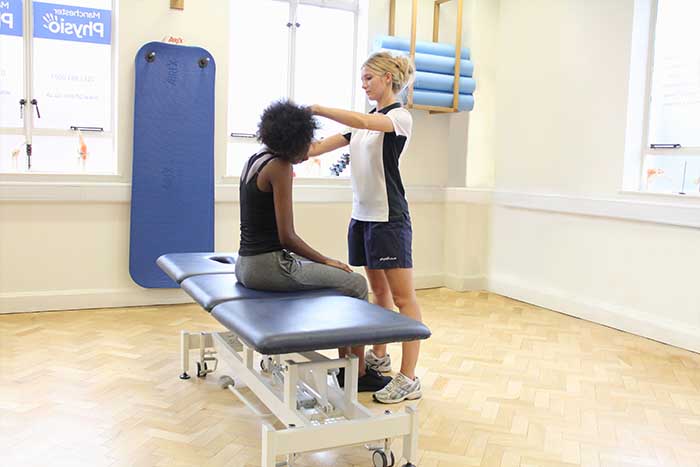
What is massage for pregnancy?
Massage treatment during pregnancy can be extremely beneficial and rewarding, especially when the female is experiencing a number of symptoms that may be causing distress during their pregnancy. Symptoms such as low back pain, swollen ankles and mood swings can inhibit the level of enjoyment felt during pregnancy which should be a period of happiness and excitement. Massage techniques using light to moderate pressure can be applied to a pregnant individual to relieve problem areas and promote relaxation.
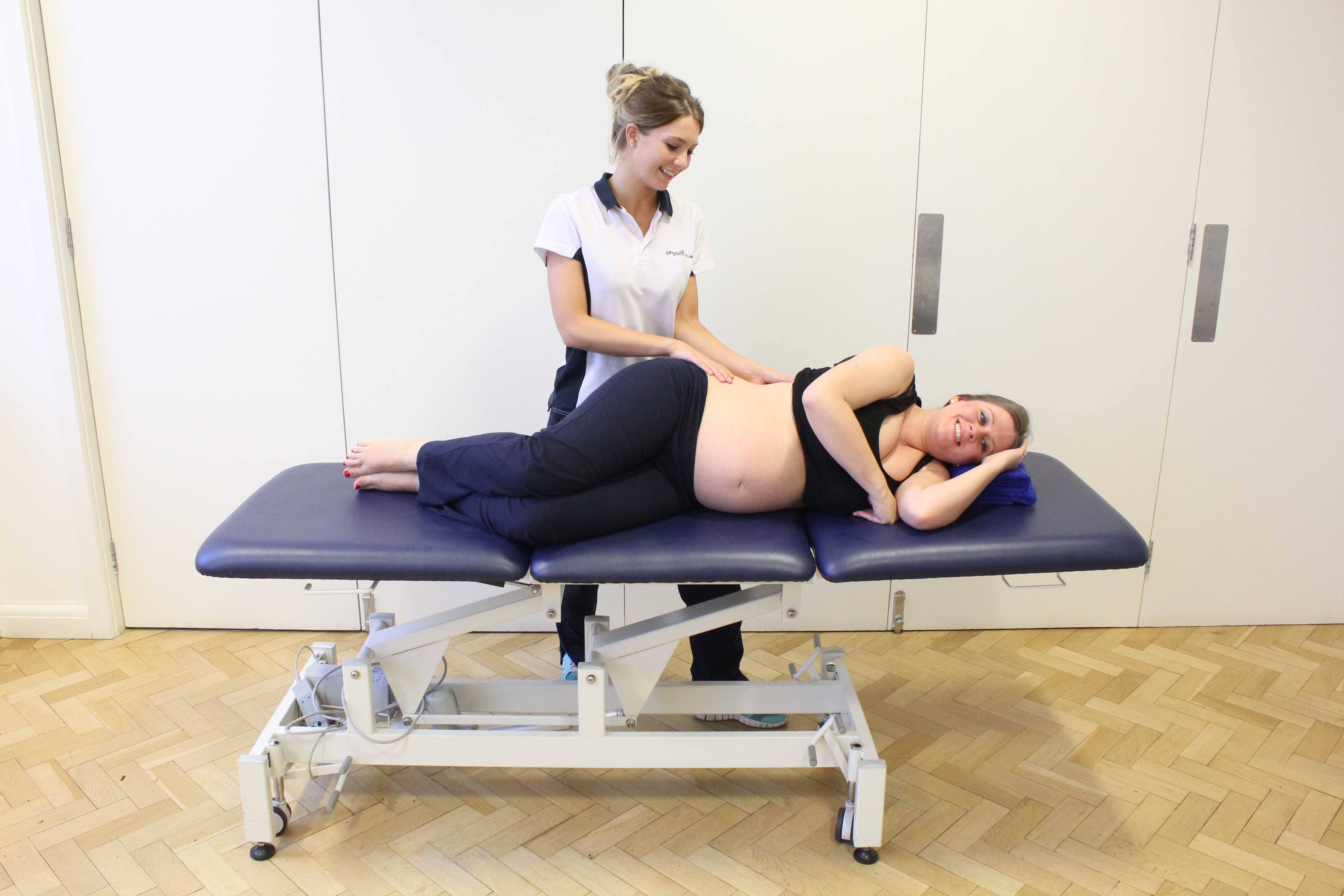 Above: Lower back massage during pregnancy
Above: Lower back massage during pregnancyWhen can massage help during pregnancy?
Massage can be received any time after the first trimester (13 weeks) up until your due date. A variation of massage techniques which vary in stroke depth, direction and rhythm can be used and adapted depending on the goals of the treatment. Massage therapy can be extremely beneficial when applied during a number of situations such as;
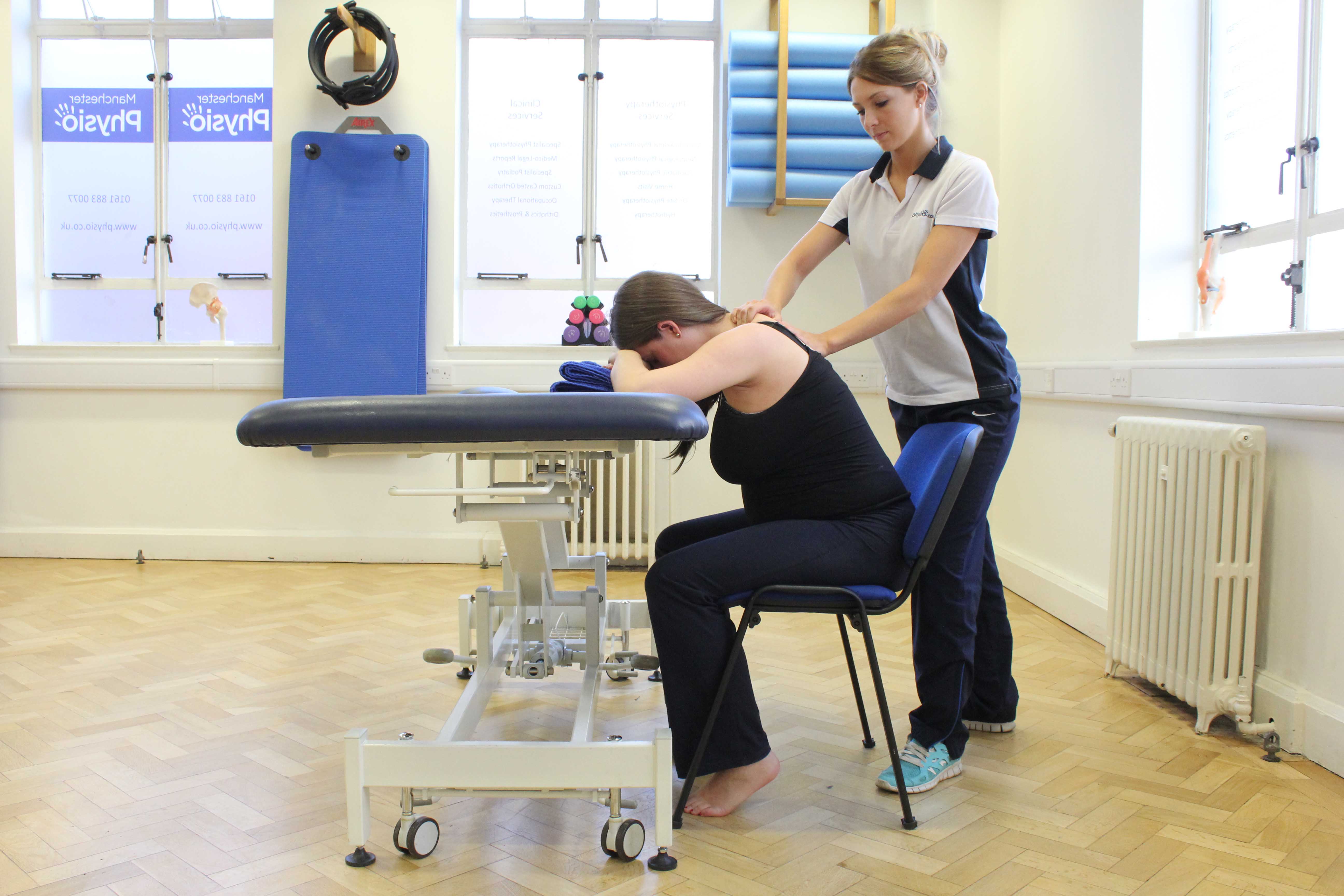 Above: Neck and shoulder massage during pregnancy
Above: Neck and shoulder massage during pregnancyMassage can be beneficial when applied to an individual suffering acute pain during pregnancy. Common painful areas include the lower back, legs and ankles. Acute pain is common during pregnancy due to the sudden increase in stress on the lower limbs as a result of carrying excess baby weight. Massage treatment can reduce the sensation of pain through the pain gate theory. The pain gate theory states signals regarding pain are blocked from reaching the brain by signals of massage, meaning the feeling of pain is reduced. Massage can also decrease acute pain by reducing muscular tension and swelling.
Massage therapy can be extremely beneficial to a pregnant woman experiencing tight muscles. Tightness within muscles is common during the duration of pregnancy due to the increase in load due to the weight of the baby. Tight muscles can also be caused during pregnancy due to an alteration in the individual's centre of gravity and therefore changes in muscle recruitment. Massage treatment including moderate to deep massage strokes can be used to warm up the tight muscles though vasodilation. The increase in tissue temperature allows the muscular tissues to become relaxed and pliable. Massage treatment involving deep and manipulative strokes can also reduce muscular tension by targeting any scar tissue or adhesive tissue within the tight muscle. An increase in tissue temperature and a reduction in scar tissue can decrease tight muscles and increase the tissues flexibility and function.
Massage treatment can also be used to reduce stress caused from pregnancy through releasing endorphins and reducing muscular tension. Stress is common during pregnancy due to the hormonal and physical changes to the individual's body. A reduction in stress will not only enable healthy development of the baby but also enable the mother to enjoy her pregnancy. Massage techniques involving gentle and slow strokes can produce changes in hormone levels. The massage stimulates the production of natural endorphins such as serotonin and dopamine which are related to positive thoughts and relaxation. Massage can also inhibit the production of cortisol, a hormone linked to depression, negative thoughts, anxiety and stress. Deep massage techniques can also be used to decrease stress by reducing the physical tension within muscles. Muscular tension can be reduced through massage by increasing tissue temperature and reducing adhesive scar tissue. A reduction in muscular tension can reduce stress as it will allow the individual to feel comfortable and relaxed.
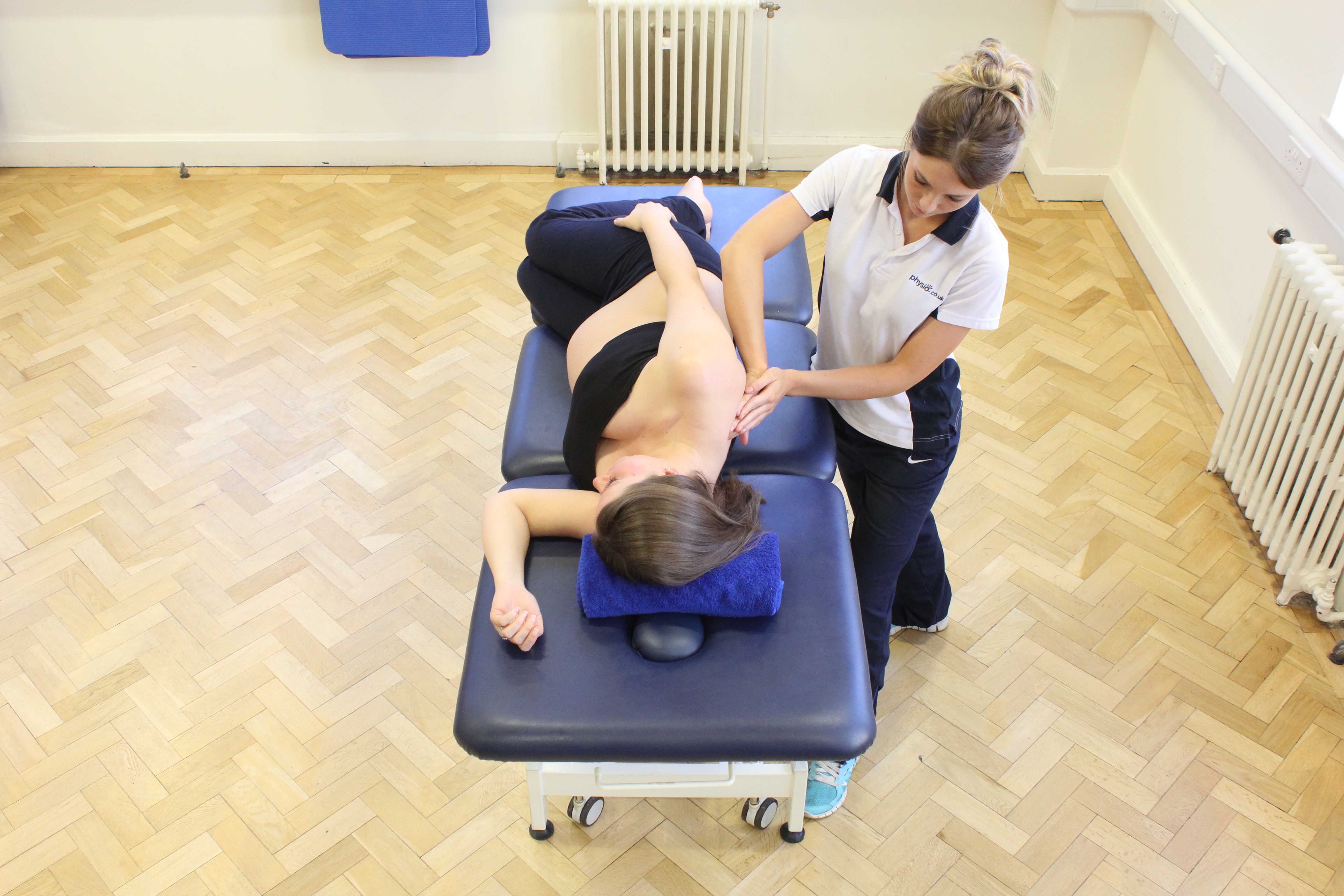 Above: Upper back and shoulder massage during pregnancy
Above: Upper back and shoulder massage during pregnancyWhat are the physiological effects of a massage for pregnancy?
During the application of massage a number of physiological effects occur which enable the individual to achieve a number of lasting benefits following the massage treatment. The physiological effects of massage include;
The application of massage can increase the temperature of tissues through the process of increased blood circulation. An increase in blood circulation is achieved through vasodilation, the widening of blood vessels which occur when the smooth muscle surrounding the vessels relax. Vasodilation allows an increase in blood circulation meaning warm blood can circulate around the tissues and close to the skin. Vasodilation can be observed through a pink colouration of the skin. The benefits of increasing a tissue's temperature include increasing the flexibility, elasticity and pliability of tissues and reducing pain.
Massage treatment can increase lymphatic drainage. During pregnancy we hold excessive amounts of fluid which tend to pool around our ankles. Massage can reduce the swelling present here by assisting the lymphatic system in the removal of lymphatic fluid and the waste products it contains. The lymphatic system is made up of multiple lymph nodes, lymph glands and lymphatic fluid. Unfortunately the lymphatic system does not possess a pump like the heart, therefore the system can become ineffective when overrun with excessive amounts of lymphatic fluid. Massage can act as the pump for the lymphatic system and help push lymphatic fluid towards lymph nodes where the fluid can be filtered and expelled from the body. An increase in lymphatic drainage can also result in decreased pain, reduced swelling and increased range of movement.
Massage can increase the release of endorphins, serotonin and dopamine. Low levels of endorphins such as serotonin and dopamine can leave the individual feeling lonely, anxious, negative and even depressed. Massage can stimulate an increase in the release of serotonin and dopamine by stimulating the autonomic nervous system. An increase in the release of endorphins will enable the individual to feel a sense of well-being, relaxation and happiness.
Massage can decrease levels of cortisol, which is a stress related hormone. Cortisol is released when the hypothalamus within the brain is perceived as a threat, this is part of the "fight" or "flight" response. Low levels of cortisol are beneficial during times of threat as it can enable the individual to become more observant, alert and reactive. High levels of cortisol can leave the individual feeling anxious and depressed. Massage can reduce levels of cortisol by reducing the stress levels and promoting relaxation.
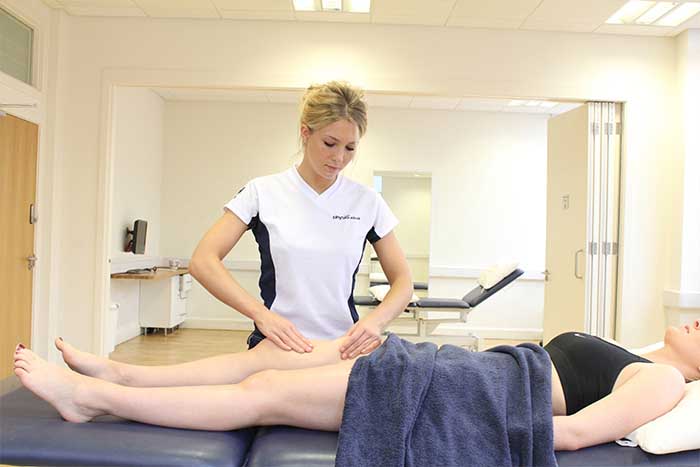
What are the benefits of a massage for pregnancy?
Massage therapy when applied by a skilled practitioner can have a number of physiological and psychological benefits for a pregnant woman, which include;
Massage therapy can be used to decrease pain. Low back pain is a common problem amongst pregnant women. Pain during pregnancy is usually due to both a sudden increase in weight gain and an alteration in the centre of gravity which can result in poor posture. Massage therapy can target the lower back muscles which become tight and tender through slow and gentle strokes. By relieving the tightness within muscles, the pain felt will dramatically reduce. A sudden reduction in pain will be experienced during the application of massage, this is achieved through a process known as the pain gate theory. The pain gate theory states impulses sent from non-harmful stimuli are able to block the spinal pathway to the brain, preventing impulses sent from harmful stimuli reaching the brain. A lasting decrease in pain can be achieved through the reduction of muscular tension. This is achieved through the reduction in scar tissue, waste accumulation, and an increase in blood circulation gained through vasodilation.
Massage therapy can be used to reduce stress and improve relaxation. Stress during pregnancy is a natural reaction to the dramatic changes that are happening in your life and to your body. Such stress can be relieved through massage therapy through slight alterations in hormone production. When you are stressed you release cortisol, which is linked to anxiety, negative thoughts and unhappiness. Massage therapy has the ability to restrict the production of cortisol and stimulate the production of serotonin and dopamine, which are the body's natural endorphins associated with positive thoughts and happiness.
Massage therapy can help relieve muscular tightness. A reduction in muscular tightness is achieved by targeting adhesive fibres, active trigger points and scar tissue during the massage. Massage treatment can help breakup adhesive connections between muscle fibres through the application of longitudinal deep strokes which can separate and stretch individual muscle fibres. Massage can also target active trigger points which are specific locations within the muscle where an accumulation of tension and waste products can cause pain and discomfort. Massage can also reduce muscular tightness by reducing and breaking up scar tissue. Scar tissue is made up of type 3 collagen fibres which are adhesive and laid down in a haphazard fashion. The structure of scar tissue means its presence can reduce flexibility, increase muscular tightness and inhibit performance. The application of deep massage techniques can breakup adhesive collagen fibre connections. A reduction in adhesive fibres, active trigger points and scar tissue can reduce muscular tightness and improve flexibility.
Massage can be used to reduce swelling. When you are pregnant your body holds a lot of fluid which tends to pool in our feet and ankles due to gravity. Through a lymphatic drainage massage, swelling can be reduced as the slow and gentle massage strokes aims to push the swelling towards lymph nodes. Lymph nodes make up one component of the body's lymphatic drainage system, which is responsible in absorbing fluids and removing waste products and toxins. The application of lymphatic drainage massage can assist in the removal of swelling which results in improved range of movement and decreased pain.
Summary
Massage therapy is a highly beneficial treatment modality during pregnancy. The application of massage can promote relaxation while reducing swelling, tight muscles, pain and stress. The benefits of massage are achieved through physiological effects of the massage. Physiological effects of the massage include an increase in tissue temperature, lymphatic drainage and endorphin release and a decrease in cortisol. The application of massage can be beneficial at any time during pregnancy but especially beneficial during the presence of tight muscles, stress and acute pain.
How can I arrange a massage to help pregnancy?
To arrange a massage to help pregnancy at Physio.co.uk, email us at office@physio.co.uk or call us on 0161 883 0077.
You can also book an appointment online and save £10.

 0330 088 7800
0330 088 7800



































